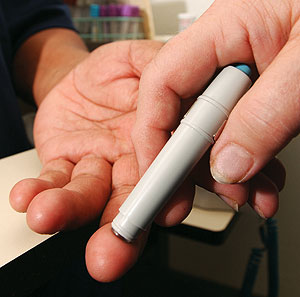
Diabetes Cuts 8 Years Off Life
 A diagnosis of diabetes means losing an average of eight years from your expected life span, new research shows.
A diagnosis of diabetes means losing an average of eight years from your expected life span, new research shows.
In addition, diabetics are more likely to develop heart disease sooner than non-diabetics, the study found.
“Having diabetes at age 50 years and over does not only represent a significant increase in the risk of developing cardiovascular disease and mortality but also a very important loss in life expectancy and life expectancy free from cardiovascular disease,” said lead author Dr. Oscar H. Franco, of the University Medical Centre Rotterdam, Netherlands, and Unilever Corporate Research, Sharnbrook, England.
Most people with diabetes – about 95 percent – suffer from the obesity-linked type 2 form of the blood sugar illness. That means that “prevention of diabetes is a fundamental task facing today’s society aiming to achieve populations living for longer and healthier,” Franco said.
His team published its findings in the June 11 issue of the Archives of Internal Medicine.
In the study, Franco’s group collected data on more than 5,200 American men and women who participated in the ongoing Framingham Heart Study. These people were followed until they developed heart disease or died. In addition, the researchers noted whether they had diabetes.
According to the study, diabetic women had more than twice the risk of developing heart disease and faced a 1.7 times higher risk of dying after developing heart trouble, compared with non-diabetic women.
For those 50 and older, diabetic men lived an average of 7.5 years less than men with diabetes, and diabetic women lived an average of 8.2 years less. Moreover, life expectancy without heart disease still fell by 7.8 years in men and 8.4 years in women with diabetes compared with non-diabetics, Franco’s group reported.
“Taking into consideration that treatment of diabetes and its complications accounts for at least 10 percent of health-care expenditure in many countries, effectively preventing diabetes will not only represent an increase in life expectancy and the number of years lived free from cardiovascular disease but may also represent important savings for health care, at least with respect to direct medical costs,” Franco said.
Dr. Hooper’s Comment:
One of the biggest tragedies I see in the clinic is the current mismanagement in how to prevent or control type two diabetes. It is very sobering to think about the number of years of life lost by this basically PREVENTABLE disease.
If you have diabetes, or suspect that you do, it is important to
take measures to control it, or even reverse it, as uncontrolled or
ignored diabetes can result in serious complications including:
* Heart disease
* Kidney disease
* High blood pressure
* Accelerates the aging process
* Blindness
* Stroke
* Nerve damage
* Blood flow problems
* Loss of feeling, particularly in the lower legs
* Burning, sensitivity and coldness of the feet
* Higher-risk pregnancies
* Coma
* Even death
Further,
diabetes can cause chronic liver disease and cancer of the liver,
according to a study published in the February 2004 issue of the
journal Gastroenterology. Researchers found that among diabetic
patients, the incidence of chronic liver disease and cancer of the
liver was about twice the incidence of patients without diabetes.
There
is also a strong relationship between type 2 diabetes, obesity and
depression. About 80 percent of people with diabetes are also
significantly overweight. Depression together with obesity is a
strong risk factor for diabetes. It is clear that people with diabetes
are more likely to be depressed, but whether it is a result of obesity
or diabetes – or both – remains unclear.
However, believe or not; diabetes is close to 90 percent preventable, as it is often a direct
result of dietary and lifestyle factors. The sooner you begin to treat
the diabetes, the easier it will be to control, so it is important to
take action as soon as possible. In other words, if your fasting blood
sugar is approaching the 100 level don’t wait for it to go up before
making changes to your diet and lifestyle. So what changes should you
make?
The most basic changes would be to restrict all grains and
sugars from the diet, while increasing your exercise.
Nearly all type 2
diabetics need to swap out their grains for other foods, as I discuss
in my article on Health Promoting Nutrition in The Wellness Protocol. Some people will benefit from using protein
for the substitution, while others will benefit from using more
vegetable-only carbohydrates.
Exercise
works by increasing the sensitivity of insulin receptors so the insulin
that is present works much more effectively and your body doesn’t need
to produce as much.
Most people, especially doctors, tend to not
appreciate how powerful exercise is. However, I believe it needs to be
viewed like a drug–you have to be very careful with the dose. If the
dose is not high enough, it will not work.
Making these changes
in your lifestyle will help to optimize your insulin levels. As some
people may know, blood sugar is only the symptom in most diabetics; the
real challenge is to control your insulin levels. Once the insulin
levels are stabilised it is common for the blood sugar to come back to
normal levels.
Along with controlling your diabetes, these basic
lifestyle changes will also lead to several inevitable side effects
like increasing your energy and normalizing your weight, so getting
started today will likely lead to an increased quality of life on many
different levels.





